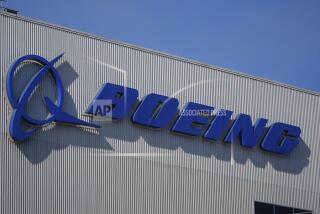Boeing Chief Says Region Was Not Targeted for Cuts
- Share via
Boeing Co. Chairman Philip Condit, in his first explanation of why the company is eliminating 6,000 jobs in Southern California, said Tuesday that the company did not target the region for a hit or mislead state officials about its plans.
Condit said the decision was driven purely by the economics of the aircraft industry and that he “views the situation in California very positively.”
Meanwhile, Condit said during a conference call with reporters, Boeing may shift a small amount of refurbishing work--up to four planes--to Long Beach in an effort to ease a space crunch in its Washington plants.
The company is reviewing alternate sites for the retrofit work needed on two 737-600 and two 737-800 test planes, which will be converted and sold as passenger jets. The firm’s Seattle delivery center is near full capacity.
Boeing is considering keeping the work in its Seattle-area plants, sending it to outside contractors or moving it to Boeing plants in Long Beach or Wichita, Kan., according to Boeing spokeswoman Susan Bradley. A decision is expected in the next few months.
“Long Beach has a pool of very skilled workers, and they have very fine facilities,” Bradley said. “It’s a serious option; it’s not something that we would do just as a courtesy.”
Still, the shift would not produce new jobs and would be only a temporary project rather than the hoped-for addition of new assembly lines.
Late last year, Boeing officials gave strong signals to Gov. Wilson’s administration that the company would transfer major subassembly operations on the 737 jetliner to the Long Beach plant.
The California Trade and Commerce Agency had prepared a multimillion-dollar package of economic incentives, hoping that it would further solidify Boeing’s plan to move the work.
Exactly what changed Boeing’s thinking so drastically, as well as the timing of that change, is not clear. But the decision was complicated by the emergence of serious problems on Boeing’s 737 assembly lines in Seattle. Introducing another change while trying to unravel problems with the 737 was seen as taking a critical risk.
In late February, Condit informed Wilson that cutbacks were likely in Long Beach. He attempted to sweeten the bitter pill by pledging that all of Boeing’s expansion of space-related work would occur in Southern California.
Nonetheless, when Boeing finally disclosed its decision last week, the severity of the cutbacks surprised California officials. The job reductions on the MD-80 and MD-90 were expected, but the closure of the Monrovia plant with its transfers to Texas and the relocation of 717 management personnel from Long Beach to Seattle were big surprises. They accounted for 2,000 of the 6,000 jobs being lost.
“We evaluated about 10,000 possibilities,” Condit said Tuesday. In deciding to scrap plans to move more work to Long Beach, “the biggest issues were the difficulty and cost of relocating a [production] line.”
Condit dismissed the notion that his company’s big California cutbacks might have been a signal to state officials that Boeing is dissatisfied with conditions here.
“There’s no message,” Condit said. “What we were looking at were the fundamental economics of consolidation.”
California officials are taking seriously the idea that Boeing has significant growth potential in its space operations.
Long Beach will be the base for Boeing’s sea-launch program, which will provide launch services from a platform that will be home ported and serviced there.
In addition, last year Boeing won the Air Force contract to produce the next batch of global positioning satellites and will manufacture them in Seal Beach. There Boeing will also produce satellites for Teledesic, a firm planning a wireless network for Internet access.
Condit called the space operations in California, which Boeing acquired in deals with Rockwell International and McDonnell Douglas, “a very-high-growth-rate activity.”
Boeing officials have privately told Wilson that the job growth anticipated in space projects could more than offset the 6,000 lost in commercial aircraft.
But Condit declined to quantify how many jobs he anticipates being created in the next five years.
Moreover, he reiterated that the MD-11 faces an uncertain future, saying the company is “struggling” to sell enough planes to keep the assembly line open. The firm would keep the MD-11 going as long as it has enough orders and it makes business sense, Condit said.
Shares of Boeing closed at $52.38, up 75 cents on the New York Stock Exchange.
More to Read
Inside the business of entertainment
The Wide Shot brings you news, analysis and insights on everything from streaming wars to production — and what it all means for the future.
You may occasionally receive promotional content from the Los Angeles Times.











